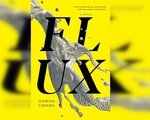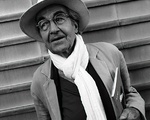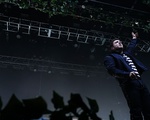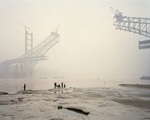Contributing writer
Alexander J. Gerstenhaber
Latest Content
‘Flux’ Review: Dopamine and Dramamine
One of the strongest elements of “Flux” is its refusal to conform to literary norms. At no point in reading this novel is it possible to categorize it in a single genre. Although the book’s amorphism can be confusing at times, the novel would not function without it.
René Burri’s ‘Brasília’ and the Emotional Conflict of Purpose-Built Cities
Fortunately, armed with a camera and profound ability to discern the sentiments of his time, the iconic Swiss photographer René Burri created pictures of the time which are both subtle artistic masterclasses and emotional time capsules.
Salgado, the Sahel, and Photography’s Biggest Dilemma
Sebastião Salgado’s book “Sahel: The End of the Road” is neither mesmerizing nor captivating. In fact, the vast majority of its images make the viewer want to look away.
McCurry, Meiselas, and the Mystery of Imagination in Documentary Photography
Several years ago, my parents gifted me a copy of National Geographic’s “Asia and Oceania: Around the World in 125 years.” My history-loving, faraway imagination was seduced by the book, transporting me to the mountains of Kashmir, ports of Victoria Harbor, and jungles of Bagan to live a multitude of lives I had never before conceived of.
Elvis for the Night: Bazzi’s Halloween Charisma at House of Blues Boston
Bazzi’s career has come a long way since his musical beginnings on Vine in 2015, and his Halloweekend performance at House of Blues Boston felt like a celebration of his journey.
bazzi house of blues image 4
“How cool is it that we are all here to enjoy music together and have fun,” Bazzi said.
bazzi house of blues image 2
Bazzi was dressed to look like the legendary Elvis Presley from his 1957 film “Jailhouse Rock.”
Sharbendu De is the Artist the 21st Century Needs
“What I am trying to call out is this colonial culture of looking at our countries as a premodern, pre-industrialized nation,” De said in an interview with The Harvard Crimson.
Picturing the Past and Future — The Resurgent Importance of Nadav Kander’s Journey Along the Yangtze River
Kander implies that photography is a poor means of objectivity, preferring to use it to interrogate the world’s emotional depths.













